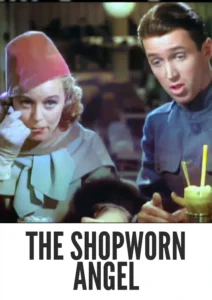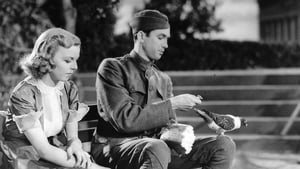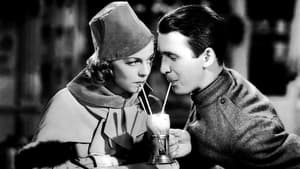Video Sources 0 Views
- Watch trailer
- The Shopworn Angel 1938 Colorized


Synopsis
Table of Contents
ToggleFrom Stage to Screen: The Shopworn Angel (1938) in Stunning Color

Step back in time with The Shopworn Angel, a heartrending sentimental romance from 1938, now beautifully colorized for a captivating viewing experience. Starring Margaret Sullavan and James Stewart, this film weaves a touching narrative of love and sacrifice amidst the backdrop of World War I. Perfect for fans of classic romance and those seeking a poignant story, this HD download brings a timeless tale of love against all odds to your screen. Note that the film was remade in 1918 with the same title, and again in 1938 as I Take This Woman.
The Shopworn Angel Storyline: A Love Forged in Wartime
The Shopworn Angel tells the story of Sam Cronin (James Stewart), a naive Texas soldier during World War I who falls deeply in love with a cynical, Broadway actress, Daisy Heath (Margaret Sullavan). Despite their contrasting backgrounds and Daisy’s initial reluctance, a bond forms between them.As Sam prepares to ship out to France, their connection deepens, leading to a whirlwind romance. Daisy, known for her hardened exterior, finds herself genuinely falling for Sam’s earnest charm and unwavering affection. However, their love is tested by the uncertainties of war, and they must confront the possibility of separation and loss. The film explores themes of love, sacrifice, and the transformative power of human connection in the face of adversity. Ultimately, The Shopworn Angel is a moving and tender portrayal of love found in the most unexpected circumstances.
Movie Cast
The film features stellar performances from its lead actors:
- Margaret Sullavan as Daisy Heath
- James Stewart as Pvt. William “Texas” Cronin
- Walter Pidgeon as Major David Black
Movie Genre
The Shopworn Angel falls into the genre of sentimental romance, with elements of drama and war that add depth to the love story. Its emotional narrative and heartfelt performances make it a timeless and engaging film.
Historical Context: Hollywood’s Golden Age
Released in 1938, The Shopworn Angel exemplifies the sentimental romance that defined Hollywood’s Golden Age, showcasing the era’s focus on emotional storytelling, charismatic stars, and high production values.
Colorization Details
This colorized version of The Shopworn Angel has been carefully restored using modern digital techniques, enhancing the visual appeal while preserving the film’s original emotional depth. The colorization process involved analyzing the grayscale tones of the original black and white footage and assigning appropriate colors to each scene. This meticulous process brings new life to the characters and settings, making the story even more engaging for modern audiences.
Technical Details
- Director: H.C. Potter
- Screenplay: Waldo Salt
- Story by: Dana Burnet
- Cinematography: Joseph H. August
- Edited by: Thomas J. Held
- Production Company: Metro-Goldwyn-Mayer
- Distributed by: Metro-Goldwyn-Mayer
- Runtime: 85 minutes
Technical Specifications
- Download Format: MP4
- Resolution: HD (1080p)
- Compatibility: Compatible with most devices, including smartphones, tablets, computers, and smart TVs.
Reviews and Critical Reception
The Shopworn Angel (1938) is celebrated for its touching story, strong performances, and classic Hollywood charm. It remains a beloved example of sentimental romance and a testament to the enduring appeal of its stars.
FAQs
- Q: What is The Shopworn Angel about?
- A: The Shopworn Angel is a sentimental romance about a Broadway actress who falls in love with a soldier during World War I.
- Q: Who are the lead actors in The Shopworn Angel (1938)?
- A: The film stars Margaret Sullavan and James Stewart.
- Q: Is this version of The Shopworn Angel colorized?
- A: Yes, this version has been professionally colorized to enhance the viewing experience.
- Q: What makes The Shopworn Angel a classic film?
- A: The Shopworn Angel is a classic film due to its emotional storytelling, stellar performances, and timeless themes of love and sacrifice.
- Q: What is the download format?
- A: The download format is MP4, which is compatible with most devices.
- Q: What resolution is the download?
- A: The resolution is HD (1080p), providing a high-quality viewing experience.
Download Now in HD!
Watch The Shopworn Angel Today!












